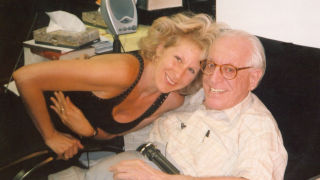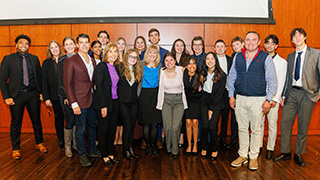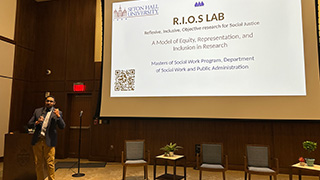REBT Series Explores Compassionate Approach to Psychotherapy
Thursday, January 23, 2020

Dr. Debbie Joffe Ellis will lead a six part series of workshops focusing on the compassionate therapeutic approach developed by her husband, American psychologist Dr. Albert Ellis.
This series has been postponed. Please check back for future updates.
In 1955, New York-based psychologist Albert Ellis introduced an unconventional idea into the field of psychotherapy. Ellis believed that feeling shame or guilt for the way your life was going was a waste of energy. Acceptance, love and compassion, he offered, was a more effective way of dealing with life's frustrations and disappointments. In Ellis' view, our response to situations, not the situations themselves, create grief or joy.
Leap ahead to 2020 and the ideas pioneered by Ellis, who passed away in 2007, continue to influence cognitive behavior therapy. Ellis' wife, the esteemed psychologist and author, Dr. Debbie Joffe Ellis is now the champion of her late husband's groundbreaking approach, known as Rational Emotive Behavior Therapy (REBT). Together they co-authored the "Rational Emotive Therapy: Second Edition," published by the American Psychological Association.
"REBT is a wholistic approach and a way of life for those who choose it," Joffe Ellis explains. "It's imbued with compassion and empathy." With a focus on the mind/body connection, REBT she adds, helps people gain the skills to "think in healthy ways and claim the power of their own emotional destiny."
Beginning Monday, February 24, Seton Hall will host a six-part series on REBT, lead by Dr. Joffe Ellis.
REBT Series Schedule
REBT Basics
Monday, February 24, 6:00 to 7:30 p.m.
The History, Development and Unique Elements of REBT
Tuesday, March 17, 6:00 to 7:30 p.m.
*The March 17 REBT workshop has been postponed and will be rescheduled later this semester.
The Tools and Techniques of REBT
Monday, March 23, 6:00 to 7:30 p.m.
Transforming and Healing Anxiety, Depression, Suicidal Ideation and Other Debilitating
Emotions
Tuesday, March 31, 6:00 to 7:30 p.m.
REBT for Individuals, Couples, Children and Groups
Monday, April 20, 6:00 to 7:30 p.m.
Pivotal Aspects of REBT Therapy Sessions: The role of the therapist, the client and
challenges for advanced practitioners.
Wednesday, May 20, 6:00 to 7:30 p.m.

Psychologists Albert Ellis and Debbie Joffe Ellis have championed a form of cognitive behavior therapy, known as REBT.
Seton Hall University's Psychology Department in the College of Arts and Sciences, and the Professional Psychology and Family Therapy Department in the College of Education and Human Services are sponsoring the series in collaboration with SPLASH (School Psychology Leadership Association of Seton Hall) and the Psi Chi and Psychology clubs.
The event is open to the public. Registration is free for Seton Hall faculty and students, and $15/session for guests. R.S.V.P. by clicking the link here.
Championing A Compassionate Approach
Dr. Joffe Ellis is no stranger to the Seton Hall campus. She has delivered presentations
focused on REBT to a receptive audience of students and professionals.
Known for creating a warm rapport with audience members, Ellis communicates the philosophy, methods and techniques of REBT, attempting to distinguish the difference between healthy and unhealthy thinking. She also utilizes live demonstrations of the approach with audience members who volunteer to participate. Ellis is a licensed psychologist and mental health counselor and is an adjunct professor at Columbia University. She is affiliated with several professional organizations, including the American Psychological Association, the Australian Psychological Society, and the American Counseling Association.
"A great deal of the empirically validated interventions in psychotherapy we see today are a result of the ideas put forth by Albert Ellis," said Professor Andrew Simon, Department of Psychology at Seton Hall. "The work of Debbie Joffe Ellis is carrying her late husband's ideas forward, educating a new generation on fundamental components of psychology. It is an honor to welcome Ellis to campus and have the opportunity to interact with her directly."
In 1993, Ellis was awarded a gold medal (along with Mother Teresa and the physician to the Dalai Lama) for her contributions to the field of alternative medicine by the Indian Board of Alternative Medicine in affiliation with the World Health Organization.
Ellis has also been recognized for her volunteer work with responders to the 9/11 terrorist attack and the family members of its victims, and for her contributions to the international development of educational programs for addiction treatment in Mexico. She currently has a private practice in New York City and is a highly sought-after speaker for lectures, workshops and seminars across the globe.
Ellis' presentation is open to the public and is of interest to students and professionals in the fields of psychology, philosophy and counseling. Click here for additional information about Debbie Joffe Ellis.
Categories: Arts and Culture, Education





